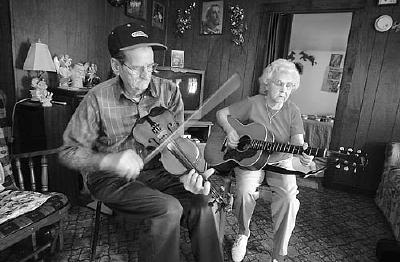MCCUMBERS FEATURED IN GOLDENSEAL
GOLDENSEAL: "Satisfaction In My Heart"
Lester and Linda McCumbers of Calhoun County
By Kim Johnson

Lester and Linda McCumbers play music at their Calhoun County home. Photograph by Michael Keller, WV Division of Culture and History
A featured story in WVs GOLDENSEAL Magazine:
Lester and Linda McCumbers have known each other their whole lives. They were married in December 1937, when they were each 16 years old. "Linda had the whole world to pick from, and she picked me," Lester says. "We walked across the hill about five miles to Joe McClung's house. He was a Methodist preacher who lived on Mill Fork, and we got married in the road in front of his house, then walked back."
"That walk back was our honeymoon," Linda adds. "My dad and Lester's dad hitchhiked over to Grantsville to get our wedding license. We set up housekeeping on Mount Run and have lived here ever since."
Lester McCumbers, son of Henry Franklin and Myrtle McCumbers, was born August 15, 1921, on Big Run in southern Calhoun County. Linda, whose friends all call her "Lindy," was born Malinda McCumbers on August 3, 1921, on Mount Run in Calhoun County, the daughter of Galry and Ada (Cottrell) McCumbers.
All of the children from the area walked together to attend the Beech Grove School at Nicut. When Lester and Linda finished school there, their formal education was over.
In order for them to attend high school, they would have had to walk about 10 miles to Orma to catch a bus, then ride about 20 miles into Grantsville.
Not very many students from the area went to high school at that time, because even the children were needed to help their families with the farm work in order to survive.
"Before school started every morning, each of us girls had a cow to milk," Linda recalls. "While we were at school, Dad would take the horse and pull some logs up into the yard. After school was out, we'd have to go home and cut them into firewood.
My older brother Bernard would get on one end of the saw, and I'd take turns with my sister India on the other end. If Dad was gone, we'd have to go up on the hill and get the fodder down for the horse and cows to eat. We'd have to tie ropes around it and drag it all the way down the hill.
"My mother did her washing on a washboard, and we would help her with all that work every week. She'd build a big fire outside to heat the water in a big iron pot," Linda says.
"We'd put lye in the water and boil all the white clothes in it. Since Dad had a well, we didn't have to carry water from the creek like a lot of other people. We had to work almost all the time just to get by."
Often, the dirt roads would be impassable. "Sometimes, when the mail carrier came through the country from Villanova on the Elk River over to Servia and on to Orma, the mud would be up past the horse's knees. Almost nobody had a car or truck.
If you weren't lucky enough to have a horse, you had to walk everywhere you went," Lester remembers. "One time when I was a boy, I walked with my dad a couple of miles to a little store. There had been a big snow, and it took us about four hours to get there and back. The snow was up to our belts. So wet and heavy, it was hard to walk in.
"Anybody born in the last 30 or 40 years can't imagine the things people had to endure to survive back when we were growing up. And it wasn't just a few people who had it rough," Lester says.
You can read the rest of this article, with lots of photos, in Goldenseal, available in bookstores, libraries or direct from Goldenseal. Back issues generally available.